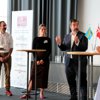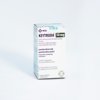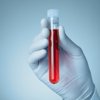Fritextsökning
Artiklar per år
Innehållstyper
-

From lab to patient – the art of developing new antibody therapies
For 25 years, Danish company Genmab has been developing antibodies and has managed to get several drugs all the way to the patient. Esther Breij has been along for much of the journey and has experienced setbacks, but also huge discoveries. “It’s amazing when you succeed,” she says.
-

Anna Törner: ”Mom, do you think you’ll ever get married again?”
”I realize I’m slowly descending into that familiar statistical rabbit hole, where life’s biggest uncertainties are reduced to point estimates and confidence intervals”, Anna Törner writes in a column.
-

“We should avoid surgery if we can”
Since February this year, she has been Scientific Director Life Science at the Karolinska Institutet. Life Science Sweden met Anna Martling for a talk about role models, surgery and Sweden’s strengths and weaknesses in medical research.
-

What will be the next big hype after obesity? – An expert panel highlighted their top picks
What will be the next big trend in life science? Everything from Alzheimer’s, Crispr and Omics were highlighted when the issue was debated at this year’s major life science event in Lund.
-

Ingrid Lönnstedt: ”The confidence interval and its width”
Always keep an eye on the width of your and others’ confidence intervals, writes Ingrid Lönnstedt in a science column.
-

MSD discontinues two Keytruda trials
MSD has stopped two late-stage trials that tested its blockbuster immunotherapy Keytruda as a treatment for skin and lung cancer.
-

Anna Törner: Yes, I Am Sick, But Not Weak
”People often say that someone who is ill only has one wish—to get better. But I think that is not true. Someone who is ill also longs to be understood, to be respected, to not have their identity overshadowed by their condition”, writes Anna Törner
-

Danish biotech to buy struggling American oncology company
Danish drugmaker Pharmacosmos has agreed to acquire American pharmaceutical company G1 Therapeutics in a deal that amounts to 405 million dollars.
-

The investor: “The major common diseases are hot again”
She has previously been voted Investor of the Year and will now be moderating The Future of Swedish & Danish Life Science congress. We check the temperature of the industry with Nina Rawal from Trill Impact Advisory.
-

Thumbs down for lecanemab in the EU – “Very surprised”
The Azheimer's drug lecanemab has received a negative assessment from the European Medicines Agency’s Committee for Medicinal Products for Human Use (CHMP), according to an announcement made by the Agency last week. Bioarctic’s CEO Gunilla Osswald describes the reactions after the announcement as a surprise and disappointment.
-

Healthcare study: Alzheimer’s blood test shows high accuracy
A blood test for identifying Alzheimer’s has now been tested in the general healthcare setting. According to the researchers, the test was 90% accurate in making a diagnosis.
-

Gothenburg, the city of life science – We are ‘Little Boston’
Western Sweden is investing in life science within everything from advanced therapeutic drugs to femtech. At the same time, stakeholders are looking to other industries for inspiration and knowledge.
-

Nobel Prize winner Torsten Wiesel turns 100: “Old men like me should use their experience to help the young”
In 1955, a young Torsten Wiesel jumped on a boat to the US and embarked on a fabulous career as a neuroscientist, crowned with a Nobel Prize for his work. Now 100 years old, he looks back on an intense life and his upbringing in Stockholm, Sweden, which shaped his desire to help the vulnerable in society.
-

Innovative start-up helps doctors, scientists and industry balance coagulation risks
For many doctors caring for seriously ill patients, for example, in stroke units and cancer wards, maintaining the life-saving balance between bleeding and thrombosis is an ongoing challenge. In the late 1980s, scientists at Maastricht University in the Netherlands developed an innovative method, the thrombin generation assay (TGA), which provides a complete overview of a physiological process crucial for maintaining normal haemostasis.
-

“Conducting research at universities is becoming more and more like working at a research hotel”
The government wants Swedish research to focus on excellence and innovation, but can the two be combined? Life Science Sweden talks to Anna Falk, a professor at Lund University, about research policy, the constant hunt for funding in academia and what constitutes ‘fine research’.
-

Bayer has cut 1,500 roles – so far
German chemical and pharmaceutical group Bayer cut more than 1,500 roles in the first quarter alone– and most of them were management positions.
-

Ny finansiering ska ta Linköpingsbolagets sensorsystem vidare
Linköpingsbolaget Argus Eye, som utvecklar sensorsystem för biologiska läkemedel, har tagit in 32,5 miljoner kronor i en finansieringsrunda.
-

Carl Borrebaeck – professor and serial entrepreneur with a taste for speed
Award-winning cancer researcher, the founder of many listed companies, and constantly in the academic and commercial spotlight for decades. However, Carl Borrebaeck, Professor of Immunotechnology at Lund, is not yet satisfied. “We have a new, potentially super exciting project in the pipeline,” he says.
-

Japanese pharma to buy US drugmaker for $2.4 bln
Japanese Ono Pharmaceutical buys the American cancer drug developer Deciphera Pharmaceuticals in one of the largest acquisitions in the industry so far this year.
-

Ancient DNA provides new insights – “The immune system lost its job”
Ancient bone remains from our ancestors have provided new insights into the prevalence of multiple sclerosis. By looking back in time, researchers can provide a possible explanation for why the disease is more prevalent in northern Europe.
-

KI’s freezer fiasco investigated: A chain of failures
A chain of combined technical and organisational shortcomings caused the freezer breakdown at the Karolinska Institute during the Christmas holidays, destroying more than 47,000 samples. This was the conclusion of an internal investigation.
-

Nocebo – the evil twin that makes you feel worse
The placebo effect is well known in healthcare, but not so its opposite: nocebo. “The effect is small, but it can have major repercussions,” says Uppsala researcher Charlotte Blease, co-author of a book on the phenomenon.
-

The Covid pandemic accelerated the development of cancer vaccine
The Covid pandemic gave a major boost to the vaccine field. The Danish biotech company Expres2ion Biotechnologies, which is developing a vaccine against breast cancer, testifies to this.
-

Study: Popular diabetes treatment is not associated with thyroid cancer
Concerns raised about an association between GLP-1 analogues, used to treat diabetes and obesity, and an increased risk of thyroid cancer are not supported by an extensive Scandinavian study.